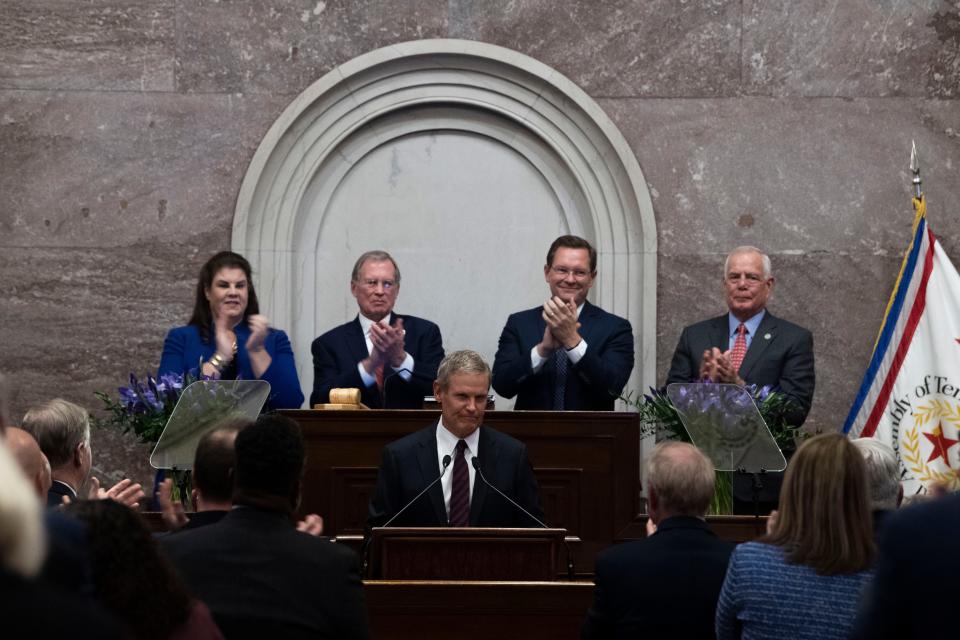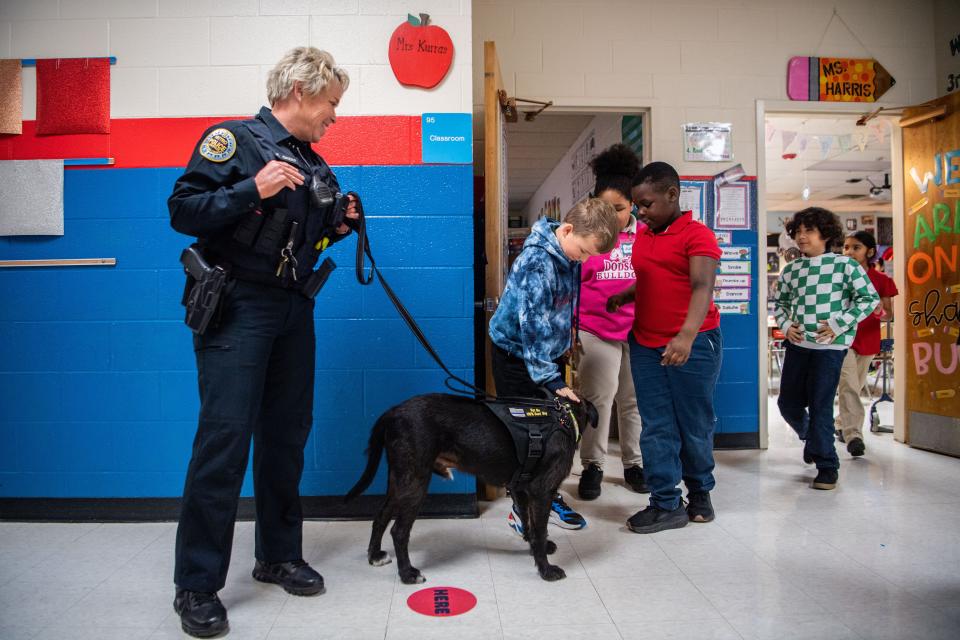TN Gov. Bill Lee isn't wrong. Students deserve better school choices than they have now
As expected, Gov. Bill Lee spent a portion of his State of the State address discussing his plan to expand that the state’s school choice program. He wants to invest another $141 million into the program, eventually making the taxpayer-funded vouchers available to families across the state, regardless of income.
Lee believes that school choice is the best way to ensure every child in Tennessee has access to the best education possible. He asserts that public schools are still valuable, but opponents argue that the measure will de-fund already struggling schools and lead to worse outcomes. They also point to results from school districts in other states with expanded voucher programs to back their claims.
It’s a contentious topic, with both sides claiming to care about the best interest of the students involved. Yet as the debate heats up, it’s not hard to see that the students are the ones losing most of all.
At a time when students need access to both high-quality public schools and inclusive independent institutions, many children in Tennessee have neither
State of the State: Hecklers feel powerless. But Gov. Lee is right: Civility is strength
While MNPS celebrates successes, the majority of students struggle
In 2022, Metro Nashville Public Schools (MNPS) threw a party to celebrate achieving level 5 status. Forward progress is always great, but as Opportunity Nashville Executive Director Tanaka Vercher stated in an op-ed for The Tennessean, it wasn’t enough. It’s still not enough.

While 5 is the highest level granted by the Tennessee Department of Education’s TVAAS, or Tennessee Value-Added Assessment System, it measures only improvement from one year to the next and is, thus, not indicative of actual proficiency in any given year. As an example: If 70 is considered a “passing” grade, movement from a 25 to a 40 would be considered significant growth — though, from a hard-score perspective, it’s still failing.
Regarding proficiency — in subjects including reading, Languages Arts, math, science and social studies, as measured by the Tennessee Comprehensive Assessment Program (TCAP) — MNPS is failing. In 2022, only 26.9% of students met or exceeded expectations. In 2023, the percentage jumped to 28.5%. It’s an improvement, yes, but not one that is sufficient, not if your child is among the 71.5% who are “below-” or “approaching expectations” (with the latter signifying that a student is still “below expectations,” just not by as much).
Administrators of struggling districts and their school board members say often that they’re trying, that they’re working against incredible challenges to educate the vast majority of their city’s children. I believe they are sincere and that the challenges they’re facing are real. But amid the struggles, as the responsible adults fight for more funding, and fight to retain teachers, and fight for the ability to teach to students not tests … what do we make of the children left in perpetual limbo?
There is an expectation of loyalty, particularly for low-income and families of color, that manifests in large-scale fearmongering about the role individuals play in public schools’ decline. We’ll lose funding, they say; things will be worse if you leave. But the concern is never as loud for the child who can’t read on grade level, or at all, whose prospects will most certainly be impacted by his staying.
Forget, for a moment, the would-be physicists and physicians, the journalists and teachers we lose when schools fail. How can one simply break the cycle of generational poverty without a solid, foundational education? How can he provide for his family? How can he become a productive member of society?
Why don’t we, collectively, ask these questions when demanding public school? And why do we diminish the voices of those who do? Why do we object to tax dollars being funneled to private schools without also objecting to the fact that tax dollars currently support failing public schools?
Every taxpaying citizen has a right to well-performing public schools, whether residing in Bordeaux or Brentwood. And when those schools don’t exist—whether because families are zoned for schools that have repeatedly shown their inability to adequately prepare students for the next level, or because students are unable to secure placement in a better performing school via lottery or other intradistrict means—those parents have a right to use said tax funds to access an education that will benefit their child.
Kids should get a shot at private school but must be prepared for the rigor
When considering Lee’s expanded voucher plan, I am less concerned about academic accountability than his most vocal critics, namely because accountability, in and of itself, serves no end. The public school districts in which the majority of students fail to meet expectations are already being held accountable. Yet where is the recourse, other than to ask families to wait, to be patient, to trust that administrators and school board members will somehow, eventually, turn the tide?
Ultimately, I fully expect a student moving from a public school with 30 kids in a class and an emphasis on TCAP prep to initially struggle in a more rigorous private school with smaller classes and the ability to teach subjects more deeply. That said, Lee’s plan to provide more school options is not without fault, particularly regarding low-income students of color who are most impacted by those poorly performing public schools.
I’ve heard of no plans to ensure every public school student who may benefit from a private school education will be made competitive enough for admission, whether via their own competitiveness or the institution’s willingness to accept them. And speaking of acceptance, how well will Black and brown voucher kids be able to acclimate to private schools that, in many cases, have predominately white student bodies and little, if any, faculty and staff of color.

Lee suggests that the move from public to private school will inherently improve educational outcomes. But as a Black mother who has had children in private schools (they’ve also homeschooled and attended public schools), I can confirm that these oppressively white environments can have a devastatingly negative impact on educational performance and overall mental health.
Few things will decimate a kid’s spirit more efficiently than learning that a school that has “accepted” him has done little more to prepare for his arrival than assign his seat — that, when the inevitable racist comment or action arises, the administration is incapable of addressing it or making proper amends.
In his State of the State address, Lee said that it was time for parents, not government, to decide where and what their children learn. It was a statement that sounded eerily familiar to the sentiments that led to the founding of many Tennessee private schools in the first place.
Across the state, “segregation academies” were created when the federal government applied pressure to cities like Nashville that had, until that point, refused to desegregate public schools following 1954’s Brown vs Board of Education Supreme Court decision. Through the early 1970s, citizens who also believed that parents should have the final say in their children’s educations threw up independent institutions like they changed their clothes, one after another created in partnership with local churches that had unoccupied facilities on weekdays.

Now, amid continued attacks on books and curriculum that reveal the diversity of the American experience, it’s perhaps no surprise that Lee and his GOP contingent seek to funnel children into these schools that are far more likely to teach Nehemiah’s rebuilding of the temple in Jerusalem (which Lee referenced in his address) than the 1957 bombing of Nashville’s Hattie Cotton Elementary School by white segregationists.
After all, Lee is the same man who referred to a plan to pay $250 million to the historically and criminally underfunded Tennessee State University as an “investment” — instead of the partial payment of a debt it actually is.
Personal essay: How reading with a Nashville kindergartner changed and transformed me
Sadly, there is no ideal school for the students who need to most help
Politicians and pundits on both sides of the debate would argue that their efforts are in service to Tennessee students, that the future of our state rests in the ability of future generations to care for themselves and their families, to lead their fellow citizens to and through a world we’ve yet imagine. But there are real students from real families caught in the middle of this back-and-forth over school choice.
The fact that students shouldn’t be forced to attend the many public schools in Tennessee are failing is not a Republican talking point, nor is it Dem-speak to say that Governor Lee’s expanded voucher plan is riddled with holes.
But for any Tennessean who’s paying attention and truly cares about our students, the most important takeaway is this: For the state’s most vulnerable students — those who have been failed time and time again — there is no ideal choice for schools. And that is the real crisis.
Andrea Williams is an opinion columnist for The Tennessean and curator of the Black Tennessee Voices initiative. She has an extensive background covering country music, sports, race and society. Email her at adwilliams@tennessean.com or follow her on X (formerly known as Twitter) at @AndreaWillWrite.
This article originally appeared on Nashville Tennessean: Too many public schools are failing: Tennessee children deserve better

